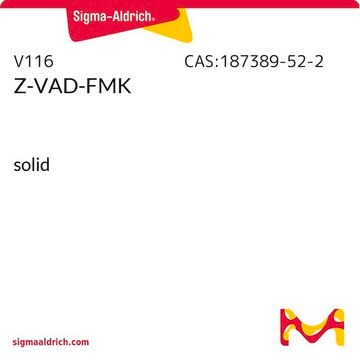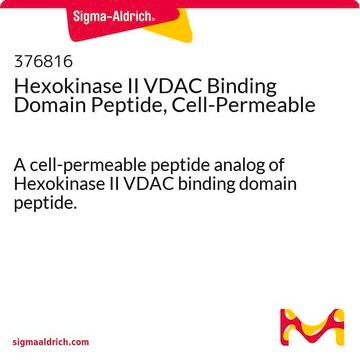197217
Bcl-xL BH44₋23, Human, Cell-Permeable
A cell-permeable peptide that prevents apoptotic cell death by directly binding to the voltage-dependent anion channel (VDAC) and blocking its activity.
Synonyme(s) :
Bcl-xL BH44₋23, Human, Cell-Permeable, HIV-TAT₄₈₋₅₇-β-Ala-Bcl-x L BH4₄₋₂₃, Ac-GRKKRRQRRR-βA-SNRELVVDFLSYKLSQKGYS-OH
About This Item
Produits recommandés
Niveau de qualité
Pureté
≥95% (HPLC)
Forme
lyophilized
Fabricant/nom de marque
Calbiochem®
Conditions de stockage
OK to freeze
desiccated (hygroscopic)
Solubilité
20% acetic acid: 5 mg/mL
DMSO: 5 mg/mL
Conditions d'expédition
ambient
Température de stockage
−20°C
Description générale
Actions biochimiques/physiologiques
Voltage-dependent anion channel (VDAC)
Conditionnement
Avertissement
Séquence
Forme physique
Reconstitution
Autres remarques
Futaki, S., et al. 2001. J. Biol. Chem.276, 5836.
Shimizu, S., et al. 2000. Proc. Natl. Acad. Sci. USA97, 3100.
Informations légales
Code de la classe de stockage
11 - Combustible Solids
Classe de danger pour l'eau (WGK)
WGK 1
Point d'éclair (°F)
Not applicable
Point d'éclair (°C)
Not applicable
Certificats d'analyse (COA)
Recherchez un Certificats d'analyse (COA) en saisissant le numéro de lot du produit. Les numéros de lot figurent sur l'étiquette du produit après les mots "Lot" ou "Batch".
Déjà en possession de ce produit ?
Retrouvez la documentation relative aux produits que vous avez récemment achetés dans la Bibliothèque de documents.
Notre équipe de scientifiques dispose d'une expérience dans tous les secteurs de la recherche, notamment en sciences de la vie, science des matériaux, synthèse chimique, chromatographie, analyse et dans de nombreux autres domaines..
Contacter notre Service technique








